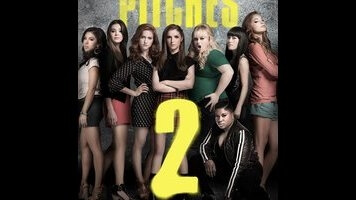Pitch Perfect 2 is an encore, a postscript, and a fresh start all at once

The original Pitch Perfect, the little a cappella comedy that could, is pure formula: underdogs plus competitive performance plus sassy zingers. But apart from a slight self-consciousness concerning its naked desire to become the next Bring It On, the filmmakers executed that formula with satisfying, rewatch-friendly zeal. A sequel might seem like an opportunity for the movie’s comic talent to stretch beyond the boundaries of its template. But expanding a movie like Pitch Perfect—at least without shamelessly reprising it—also means leaving behind the comfort of riffing off a formula. Character depth that could pass muster within the framework of a winking college sing-off movie starts to seem a little thin when those same characters are staring down graduation.
Pitch Perfect 2 deals with this shift in status quo with a variety of strategies; it’s at once an encore, a postscript, and a fresh start. In typical sequel fashion, the Bellas of Barden University, led by former outsider Beca (Anna Kendrick), are knocked from their champion perch in the opening scene, when some choreography involving Fat Amy (Rebel Wilson) goes awry during a Kennedy Center performance in front of President Obama (playing himself through stock footage). On cue, the Bellas are underdogs again, and another plucky freshman (Hailee Steinfeld) enters the fold, eager to prove herself. At the same time, the movie addresses the fact that the Bellas everyone knows from the first movie are all getting ready to graduate—or in the case of Chloe (Brittany Snow), have long since passed a sensible graduation date, intentionally failing to keep singing with her girls. Beca still has her eye on a job in the music industry, distracting her from the Bellas’ training to beat an over-cranked team of intimidating Germans in the world championships (a silly conceit, but pretty hilarious that the movie tags Muse and Fall Out Boy songs as the tools of Eurotrash villains).
With all of these storylines, plus a couple of thankfully underdeveloped romantic subplots, returning producer and new director Elizabeth Banks (replacing Jason Moore, who stays on as executive producer) scrambles to cover a lot of ground. Without the clean through-line of the original—get the Bellas to nationals—the movie sometimes feels like half a season of Pitch Perfect: The Series edited down to feature length, explaining several plot turns and location changes via establishing shots overlaid with offscreen dialogue. If the journey between musical and comic set pieces is bumpier, though, the big sequences themselves often deliver. The first movie’s underground riff-off medley gets a weirder, funnier, and no less tuneful follow-up, and Wilson has a Pat Benatar-belting scene that edges delightfully toward integrated-musical territory. Kendrick, meanwhile, hones a sort of Tina Fey Junior routine—a nice fit for a screenplay written by 30 Rock’s Kay Cannon, especially in a runner about her inability to formulate any nasty rejoinders to the beautiful, taunting leader of the Germans.
As for the musical performances, Banks (who appears again with John Michael Higgins as a pair of Christopher Guest-style goofball commentators) directs them like midrange music videos—which, to be fair, they pretty much are. Moreover, the sequel deserves credit for addressing a number of artistic limitations of the first movie’s a cappella stylings: The over-reliance on covers and novelty mashups, the emphasis on choreography over singing, and the general myopia of treating a collegiate competition as a life-or-death battle are all questioned, rather than reinforced. Banks also maintains the series’ female focus; here the men are appropriately marginalized, basically comic relief pitchers. (Keegan-Michael Key is particularly funny as a music producer.) She’s blessed with a wealth of one-joke characters made surprisingly endearing by their performers, cushioning the movie when it makes some abrupt turns into montages and side riffing. It’s not as smooth a ride as Pitch Perfect, but it doesn’t really need to be. If the first film fulfilled its destiny as the kind of movie that viewers can catch on cable from virtually any point and watch through to the end, Pitch Perfect 2 may prove better-suited to a slot in an enjoyable round of channel-flipping.